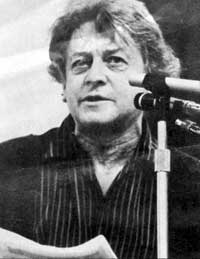13 January 2005 Edition
The Communist Party strikes back

Cathal Goulding
Eugene McCartan, General Secretary of the Communist Party of Ireland, replies to last week's Remembering the Past column, which focused on the Sinn Féin split of 1970, with reference to the 'Marxist' influence of Cathal Goulding.
In his "Remembering the Past" article of 6 January, Shane Mac Thomáis made a number of points that I would like the opportunity to reply to.
His language and use of terms are reminiscent of the Cold War and the stereotypical characterisation of how communists engage with and work with other political forces. Terms such as "infiltrated," "manipulate" and "converted to Marxism by a Russian spy" are more the stuff of some retired British spook writing spy novels for the gullible. These imply somehow that having a Marxist world view makes you incapable of making a conscious decision to join a particular organisation or openly expressing your views and winning over and convincing people that there may be another way to advance a particular goal without one's motivations being characterised as "infiltration" or "manipulation". The Republican and Labour Movements all need intellectuals in the battle of ideas in the struggle against imperialism.
The Communist Party of Ireland never sent anyone to "infiltrate" the Republican Movement. Members of the CPI and Sinn Féin have worked very closely over the years in many different campaigns in a comradely way. Over the decades, many members of the CPI have come from the Republican Movement. We do not see ourselves as some foreign import into our country but rather we are an integral part of the forces for national freedom, albeit with a specific class approach. I don't think anyone can point the finger at us and say that we ever manipulated or abused campaigns or organisations. We have disagreed with other forces, but we have always operated in a principled and honest manner.
Certainly, in the early period in the 1960s, the CPI and Sinn Féin worked very closely in different campaigns, particularly in the Dublin Housing Action Committee and "fish-in" campaigns. We helped to support all efforts to move in a left political direction, as we did with other forces within the Labour Movement. We view this now, as then, as embracing more fully James Connolly's position, that the social and national questions are two sides of the same coin.
You cannot equate this with how the "Stickies" operated or even characterise them as remotely Marxist. Anyone with an understanding of how Sinn Féin the Workers' Party (SFWP) and later the Workers' Party (WP) operated and of the political role they played over two decades will know that the CPI opposed their political positions and influence within the Trade Union Movement, internationally and anywhere else that we had the opportunity.
Our members engaged in bitter struggles to ameliorate the poisonous politics and influence that the likes of Smullan/Harris attempted to push, for example, within the Federated Workers' Union of Ireland on issues such as Section 31 and the marginalisation and isolation of other political forces. Instead, we favoured dialogue and inclusion. At an international level, we worked tirelessly to counter their presentation of the conflict in Ireland through such organisations as the International Union of Students (in which the present leader of the Irish Labour Party was foremost). In many of these struggles we were on our own.
In the 1960s, we believed that the Achilles heel of both unionism and British imperialism in the North was the denial of democracy. We worked closely with republicans, trade unionists and other progressive forces to develop and build the Northern Ireland Civil Rights Association. The outcomes of those demands and struggles are still working themselves out today. Then, the unionist monolith shattered, just as today, unionism remains deeply divided on the Good Friday Agreement.
There always have been, and I presume there still is, divergence of opinions within the republican movement. This is natural: if it were not so, then it would have long since ceased to be a force and a movement that continues to attract radical forces with strong and varied opinions.
As for the so-called "three stages" theory, politics is both an art and a science, and we should not get confused between strategy and tactics. Our view is that the struggle for an Irish national democracy was and is an anti-imperialist struggle, and that the struggle against imperialism must be on all fronts. The advance to a more socially just society is very complicated. The defence of the economic, political and military sovereignty of the 26 Counties is important and remains a priority for all democratic forces. In addition to the bedding down of the Good Friday Agreement, this is purely a means to an end: we do not see it as the end itself.
Pulling all these strands together in their complexity requires a clear understanding of strategy. There is no Chinese wall between all the different struggles: they are linked and interdependent. What we need today is greater unity of progressive and national democratic opinion on this island. The degenerate political elite of the South are not reliable allies: they will always put their own class interest first.
We need to rely first and foremost on the people of no property: the working class. A return to yesterday's rhetoric is not helpful. We can and must learn from the past, otherwise we are doomed to repeat it. Neither the Communist Party nor Marxism are the enemy of Irish national freedom but rather they are allies; and Marxism can be a very sharp weapon.


